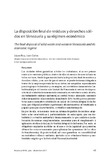La disposición final de residuos y desechos sólidos en Venezuela y su régimen económico
Fecha
2019Autor
Palabras Clave
Disposición Final, Vertedero, Relleno Sanitario, Sustentable, Sostenible, TasasFinal Provision, Landfill, Sustainable, Fees
Metadatos
Mostrar el registro completo del ítemResumen
Las ciudades deben garantizar a todos los ciudadanos, el acceso permanente a los servicios públicos, dentro de ellos el servicio de aseo urbano en todas sus fases, desde la generación hasta la disposición final de residuos y desechos sólidos, y en caso de que el servicio se preste de forma delegada a través de la empresa privada las tasas deben ser asequibles especialmente para los grupos vulnerables y sin empleo, así lo establece claramente la Carta Mundial por el Derecho a la Ciudad. En Venezuela el servicio de disposición final se efectúa de manera indiscriminada, en vertederos a cielo abierto, sin tratamiento sanitario ambiental, ni control técnico adecuado, causando daños irreparables a la sociedad y al ambiente. Esto sucede, pese a que existe un marco normativo establecido en la Ley de Gestión Integral de la Basura, que obliga al prestador a gestionarlo eficientemente y al beneficiario a pagarlo para que sea sustentable, sostenible e ininterrumpido. En pos de ello, es necesario crear un sistema de gestión de residuos adaptados a las características y particularidades de cada región, que sea sustentable y sostenible ambiental y financieramente, lo que conlleva a la elaboración de normas complementarias, necesarias para el cumplimiento y aplicación efectiva de la Ley de Gestión Integral de la Basura. Por ende, es obligatorio implantar medidas en el marco de la legalidad que permitan obtener los recursos necesarios para optimizar las operaciones de los sitios de transferencia y disposición final, así como garantizar su convertibilidad en verdaderos rellenos sanitarios, ajustados a los estándares técnicos y ambientales exigidos por la Autoridad Nacional Ambiental.
Colecciones
Información Adicional
| Otros Títulos | The final disposal of solid waste and waste in Venezuela and its economic regime |
| Correo Electrónico | lopezqjuan@yahoo.com |
| Editor | SaberULA |
| ISSN | 1317-9535 |
| Resumen en otro Idioma | The cities must guarantee all citizens permanent access to public services, including the urban cleaning service in all its phases, from generation to the final disposal of solid waste and waste itself, and in case the service It is provided in a delegated way through the private company, the rates must be affordable especially for the vulnerable groups and without employment, this is clearly established in the World Charter for the Right to the City. In Venezuela, the final disposal service is carried out indiscriminately, in open dumps, without environmental sanitary treatment, or adequate technical control, causing irreparable damage to society and the environment. This happens, despite the existence of a regulatory framework established in the Law on Integral Garbage Management, which obliges the provider to efficiently manage it and the beneficiary to pay for it to be sustainable and uninterrupted. In pursuit of this, it is necessary to create a waste management system adapted to the characteristics and particularities of each region, which is sustainable and environmentally, and also financially sustainable, which leads to the elaboration of complementary standards, necessary for compliance and effective application of the Law on Integral Garbage Management. Therefore, it is mandatory to implement measures within the framework of legality to obtain the necessary resources to optimize the operations of the transfer and final disposal sites, as well as guarantee their convertibility into real sanitary landfills, adjusted to the required technical and environmental standards by the National Environmental Authority. |
| Colación | 45-76 |
| Periodicidad | Semestral |
| País | Venezuela |
| Institución | Universidad de Los Andes |
| Publicación Electrónica | Provincia |
| Sección | Revista Provincia: Artículos |






